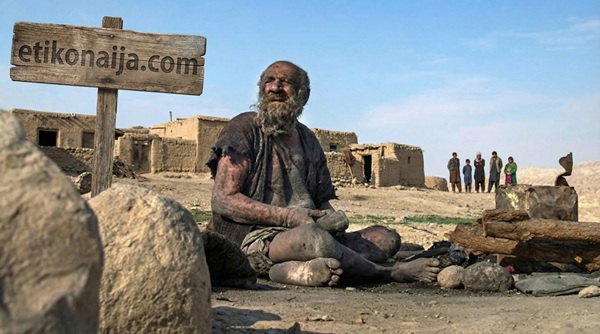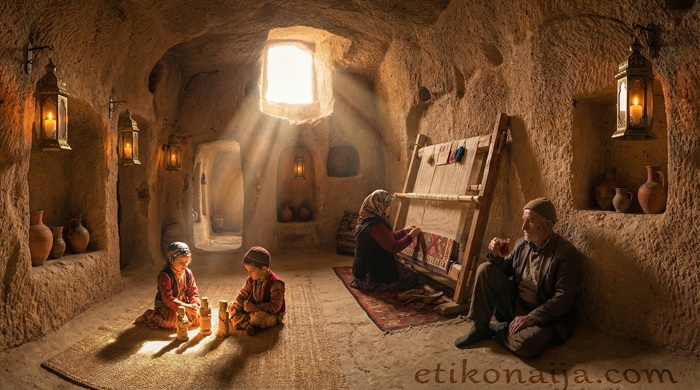In a quiet stretch of southern Iran, far from the bustle of large cities, lived an elderly man whose name became known across the world for reasons he never sought. His name was Amou Haji, though many referred to him simply as “Uncle Haji.” For decades, he lived alone in the outskirts of a small village, rarely speaking, rarely accepting help, and famously refusing to bathe. Over time, he became the subject of worldwide curiosity, and eventually, global headlines. Yet the story of his life was deeper than the label that followed him. It was a story shaped by heartbreak, isolation, habit, and a complicated relationship with the outside world.
This article revisits his long life, his unusual choices, the beliefs that guided him, and the events surrounding his death in 2022. It seeks to provide a thoughtful and respectful portrait that goes beyond the popular headlines.
A Life That Drifted Away From Society
Many accounts agree that Amou Haji’s withdrawal from the world was not sudden. It began with a personal disappointment in his youth, a moment that seems to have shaped his life more than anything else. Local villagers in the Fars province said that Haji had once been an ordinary young man with the same hopes as anyone else. He had fallen in love and had hoped to marry. The romance, however, ended abruptly when the woman rejected his proposal.
The experience affected him deeply. He withdrew into himself, distancing not only from the woman he admired but from society in general. What began as a period of grief gradually became a complete departure from conventional life. Haji left his community and began to roam, avoiding direct contact with others and dismissing the routines most people take for granted. He stopped bathing, refused to settle in a house, and avoided cooked meals. This withdrawal, which started as emotional retreat, gradually hardened into a lifestyle that lasted more than sixty years.
Life on the Outskirts of Dezhgah
By the 1950s, long before most people had ever heard his name, Haji had settled in the dry outskirts of Dezhgah, a small village surrounded by rocky hills. It was here that he began living as a hermit. His home, if one could call it that, shifted between the open ground, shallow pits he dug himself, and later, a simple hut built by local residents. He preferred to sleep outdoors, on bare earth, even when temperatures dropped. For him, direct contact with nature seemed comforting, and the presence of a roof did not matter much.
The villagers grew accustomed to him over time. Although his habits were unusual, he did not trouble anyone, and the people around him eventually came to accept the way he lived. Some kept a respectful distance, while others brought him food and cigarettes. He was often quiet, but he did not reject polite greetings. He simply wanted space and little more.
A Fear of Water and the Unwritten Rules He Lived By
The feature that later made him a global curiosity was his stark refusal to bathe. Haji believed that water, especially bathing water, weakened the body. He claimed that washing made him ill and that avoiding water was essential to his survival. This fear was so strong that when a group of villagers once attempted to wash him by force, he became frightened and leapt from a moving vehicle, running barefoot into the fields until the villagers gave up the idea.
After that incident, the people of Dezhgah stopped insisting. They allowed him to live according to his own rules. These rules, although strange to outsiders, were consistent and deeply held. He would not bathe. He would not accept clean water. He would not sleep in a conventional home. He would not eat fresh food. These choices shaped every year of his adult life.
The Diet of a Man Who Lived Outside Convention
Haji’s diet was another source of local fascination. He survived mainly on the remains of animals he found near the roadside, especially porcupines. He preferred them aged, not fresh, and believed that spoiled meat was more suitable for him than cooked meals. When villagers tried to bring him rice, bread, or fruit, he often turned it away without hesitation.
As unusual as these habits were, they reflected the deep consistency of his lifestyle. Just as he rejected bathing, he rejected food he considered “too clean.” His approach to drinking water was similar. Instead of using pots or bottles, he filled a rusty oil can with water collected from puddles. He drank roughly a gallon a day, and it was likely the only liquid that met his requirements.
Despite the apparent risks of such habits, he lived into his nineties. His endurance puzzled many, including doctors.
A Routine Built Around Solitude
Though he spent most of his days alone, Haji did not completely avoid people. He occasionally accepted gifts of cigarettes from villagers. When he smoked, he often lit several at once, holding them between his fingers while leaning back in a shallow pit he used as a resting place. When cigarettes were scarce, he filled a pipe with dried animal dung and smoked that instead. These habits were entirely normal to him, and he did not consider them unusual.
His clothing was simple and often worn thin. During winter, he added layers of cloth and occasionally wore an old steel helmet, possibly from a past military conflict. It gave him some shelter from the cold winds of the region. His grooming methods were equally unconventional. He trimmed his hair and beard using fire, burning away the excess until he felt comfortable.
A Social Life Measured in Small Conversations
Although he lived far from ordinary routines, Haji did not reject the company of respectful visitors. Those who approached him kindly sometimes found a conversationalist who enjoyed discussing political history. Local accounts suggested he knew details about major revolutions and world events. It seems his solitude did not prevent him from paying attention to the broader world in his own way.
Village elders spoke of him with sympathy. While some younger villagers teased him, adults usually protected him. Officials in the region encouraged respect for him and discouraged harassment. To most locals, he was a figure of their community, someone whose presence had become familiar, despite his isolation.
Health Studies and an Unexpected Result
In time, interest in his lifestyle reached medical professionals. A team led by Dr. Gholamreza Mowlavi, an associate professor of parasitology in Tehran, examined Haji to understand how his body managed after decades without bathing and with an unconventional diet. Many assumed his condition would reveal serious illness, but the tests showed that he was surprisingly healthy.
The only notable issue was a parasitic infection common among those who consume raw meat. Yet even that did not appear to cause him significant discomfort. His immune system, remarkably, seemed robust. Continuous exposure to bacteria and environmental pathogens appeared to have strengthened him in ways not often seen in modern populations. This finding led some to remark that his body had adapted the way wild animals adapt to their surroundings.
His case reminded many that the human body is capable of more variation than we often expect, though it was clear that his lifestyle was the result of personal trauma and not a path others should follow.
The Bath He Accepted and the End of His Life
After nearly seven decades of refusing to bathe, Haji finally accepted the suggestion to wash. Exactly why he agreed is unclear. Some say he grew weak in old age and allowed others to assist him. Others believe he felt more secure near the end of his life. In mid-2022, the long-avoided bath took place.
A few months later, in October 2022, he passed away at the age of 94.
The official report described the cause as natural. Nevertheless, many villagers believed the bath had unsettled his body. After living in a strict routine for nearly seventy years, they thought the sudden change may have harmed him. Whether or not this belief carries scientific weight, it reflects the strong connection between his identity and the life he built for himself.
His Funeral and His Place in Collective Memory
Haji was buried in the nearby city of Farashband, close to the community that had watched over him for decades. There were no grand ceremonies, but the atmosphere was respectful. Although he had lived apart from society, the people of Dezhgah felt a sense of loss. His presence had become part of their village life. He had no children, no close family, and no possessions, but he left behind a story that will likely be retold for generations.
His life raised questions about resilience, belief, and the ways humans cope with trauma. It also reminded many that behind every unusual lifestyle, there are experiences shaping the person beneath.
@thinkgrowsuccessful This is the incredible story of Amou Haji, He is considered to be the dirtiest man to ever live. His story recently came to an end after he took his first bath in years. Soon after he became ill. #shorts #fact #crazy #interesting #history #stories #worldrecord ♬ Blade Runner 2049 – Synthwave Goose






